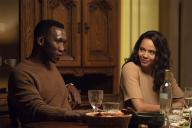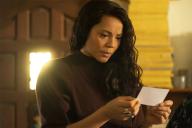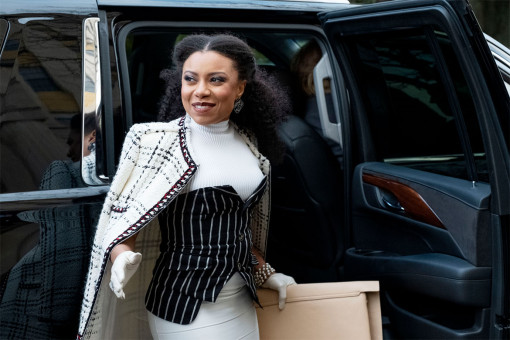In the third season of HBO's True Detective, Carmen Ejogo travels through several ages and time periods.
She goes from being a young schoolteacher whose students have gone missing to a mature married woman writing a book, to eventually becoming a ghost helping her husband to solve a decades-old murder case.
Ejogo is no stranger to moving through time or to playing iconic women, having played Coretta Scott King twice, once in HBO's 2001 Boycott, and again in 2014's Selma, and Sally Hemings in the CBS miniseries Sally Hemings: An American Scandal. She places her character in True Detective, Amelia, in the same category.
She says, "It was such a challenging job and it was a deceptive character in some ways, because it seemed there was some simplicity to what Amelia brings to the show, incredibly complex as well. You know, there is no show without Amelia. So, it was a very tricky, but exciting, job to take on.
"And the timeline aspect is something that I have had a little bit of a taste of in the past. I've done a couple of performances, Sally Hemings, way back with Sam Neill, I played her from 16 to around 60 years old, maybe 50 years old. Then Coretta Scott King, where I got to play her in two different timelines, or in two different projects.
"But this one with a fractured timeline experience was a very different, intense sort of level of a concentration and commitment that was required for sure."
In True Detective, she plays the wife of detective Wayne Hays, played by Mahershala Ali, who is haunted by the disappearance of two children, one of whom is found dead and the other who has never been found. The plot moves back and forth in time from the original disappearance to many years later when an elderly and forgetful Wayne is recalling the case for a TV documentary.
Throughout the series, Wayne's relationship with Amelia and her relationship to the case are almost inseparable.
Ejogo was at first unsure about the role, because she didn't have the necessary information to know if the character would be challenging enough. She says, "I didn't get many scripts when I first put the role on, but I could tell that it was an incredibly ambitious season.
"As I got more information from [writer] Nic Pizzolatto, it became clear to me just how incredibly complex, and important Amelia was going to be to the season. I was anxious that I was going to be maybe playing something I've done before, the frustrated, supportive housewife type character. Mother.
"That wouldn't have appealed to me, but there is something so wonderfully subversive that Nic does in this season with the character of Amelia, in the way that she grows and evolves over three decades, that makes her so far removed from that sort of cliché.
"That, even though we begin there, I think we take people on a surprising journey of emotion and personal development in the character that made her. It became a no-brainer to take the role on."
Once she got into the role, however, her brain, emotions, and skill were all deeply engaged. The challenge, really, was to make it feel cohesive, and to make it feel like a very integrated persona.
"There are so many layers that are happening, simultaneously, that needed to be embraced all at once. And, I'm the subconsciousness of Wayne. I'm the moral compass, and the North Star for Wayne, in so many ways.
"And I'm, also, the mother, the teacher, I'm in some ways the true detective of the season.
"And I'm the artist. There's so much happening, and to find ways to piece those personas, those attributes, those sensibilities together, make them feel like one authentic, truthful character was quite the task. But, the writing was incredibly supportive in that endeavor, as was working with Mahershala, in ways I didn't actually anticipate.
"He and I really had to honor the discordance in a very, very specific way that Nic writes, which is very honest and truthful to what a relationship can look like. So, while at times, it feels like it has a real flow, there are other times it feels very discordant and disconnected. I, certainly, very much used this, which was an interesting approach to characterization."
Ejogo felt that she hadn't seen a relationship like that portrayed on television before, so she was deeply invested in getting it right.
"I'm so proud, I'm so grateful for the fact that I was supported in playing the most honest version of who she is. Because, the temptation, I think, could have been there to make, to go for flashier things with the moments that I have on screen in order to make her resonate in a crowd of really interesting male characters, and incredible supporting cameo performances.
"But to stay true to the mundanity and the ordinariness at times, of what that relationship should look like, was part of my challenge. And I'm so grateful that I was directed in a way, and I had scene partners that worked with me in a way that allowed for that to happen."
In fact, the way the character was portrayed and developed was very much against the typical character development.
Ejogo says, "You can go any way with that. When you have carte blanche, the opportunity is there to create something that is really quite big, and loud, and sort of scene stealing, all of that good stuff. So to resist that, and stay true, as I said, to the quietness of Amelia, and the fact that she really is literally the voice in the background was important to me.
"You know, it's funny. There are scenes in the beginning of the season, where I'm not in focus. Where I come in, and I am literally out of focus, and I have to come into focus as the season progresses. To really stay, to really trust that the overall arc of the season, for this character, was going to be enough was the thing I had to really honor more than anything else.
"And that's a testament to Nic's brilliance as a writer, because he also doesn't play in to expectations of rhythmic delivery, of arc of character. He is quite comfortable in being really true to real life. And how unusual it is for an actor to get to play that. You think that's what we get to do all day, and in most projects we get to work on, it's very rarely written that successfully in that way.
"And so much subtext going on between me and Mahershala on screen, in so many of the scenes that we're playing. Particularly in the '80s, particularly of the relationship that we're establishing. This is a very mismatched couple. So, there is a lot that is happening at a chemical level between these two people, which is why they end up together.
"That is subtext. So it's also lived in the silences, and to be able to have a scene partner that is ... I'm not going to lie, at times Mahershala and I really weren't sure we were on the same page. We were really going at something that was pretty unusual in its connection and disconnection simultaneously.
"So, it really wasn't until, I think, we saw the final product that we both knew that we'd achieved what we aimed for."
Ejogo is hopeful that the audience will also see what they aimed for in the series. "It's so, for me, hopeful at the end of the season. I was crushed by the epic nature of the show, and in its ambition, the contemplation of love, and such a beautiful meditation on time.
"And, just, things that are so beyond the mystery of the show, and the plot of the show. It just delivers so much more than that. I can't tell you how awesome it is to be part of something that I think will be classic television. That people will go back to in the same way that they go back to season one, and think of that as being really landmark television.
"I feel so proud that I'm part of season three for the same reasons."


























